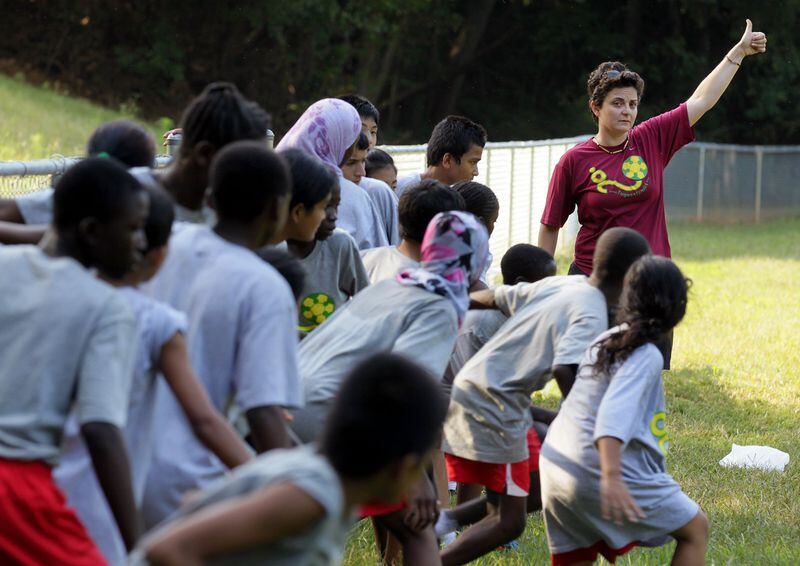Story first published in 2005
Luma Mufleh isn't the yelling, arm-waving, foot-stomping kind of coach.
Instead, she walks quietly along the length of the field, sometimes running a hand through her short-cropped mop of dark hair, other times striking a thinker's pose, with one hand tucked under her chin.
She will push when her players need pushing on the field, but she will also gently remind them not to forget their manners and say thank you when a visitor congratulates them on winning.
No, Mufleh isn't a typical soccer coach. But then she's not coaching a typical team.
Her team --- the Fugees, a play on the word "refugees" --- was formed last August in DeKalb County. Mufleh and the Decatur-DeKalb Family YMCA's Partner With Youth program created the team as a way to help refugee youths adjust to new lives in the United States, learn the importance of teamwork and have fun. She also wanted to open the sport, which can be expensive to play on the club level, to lower-income youths.
Most of the players have experienced the worst the world can throw at them. One, from Liberia, saw his father shot and killed by rebels. Another was separated from his family at age 2 and had to survive on his own in refugee camps until they were reunited several years later.
Credit: Phil Skinner
Credit: Phil Skinner
"I thought because they were boys they were tougher," said Mufleh, a refugee from Jordan. "I thought I could be harder on them, but I can't be. They have a hard time trusting people. They kept testing me and provoking me."
Sometimes the tests come off the field .
For a year and a half, Mufleh, 30, ran a small cafe --- Ashton's in Decatur --- that sold homemade desserts, sandwiches, ice cream and coffee. The job required long hours and offered little personal satisfaction. So last Thanksgiving Day she closed the shop, and a few months later she opened the Fresh Start cleaning service, which employs the parents of some of her players.
The goal of Fresh Start is to create opportunities for skilled refugees now living in metro Atlanta.
One of the first she hired was Sheela Rehmani, who fled her native Afghanistan several years ago, first going to Pakistan, then the United States. Rehmani works in the housekeeping department of an Atlanta hotel and often found that the hours weren't enough to make ends meet. She didn't hesitate when Mufleh asked her to join her team as well.
The two have become so close that Rehmani now considers Mufleh a sister. She has helped Rehmani and her sons, constantly emphasizing the importance of getting an education and maintaining good grades.
"Since they've been with her, their grades have gotten better and they have made new friends," Rehmani said through an interpreter.
Before starting the Fugees, Mufleh coached girls' soccer at the Decatur-DeKalb YMCA. After a couple of years, she realized that something was missing.
"I didn't feel spiritually fulfilled," she said. "I wanted to make a difference in someone's life."
While she enjoyed the team, most of the girls came from middle- and upper-middle-class backgrounds. But DeKalb County is one of the most diverse in the metro area. It didn't take much effort to see the large number of refugees who were settling there.
Mufleh approached YMCA officials about sponsoring a team for refugee children. She knew what it was like to be a refugee. Mufleh came to the United States to attend Smith College and later sought political asylum.
Officials were eager to help.
"We had wanted to get back into the community and do more mission work," said Stacey Stevens, director of financial development.
Mufleh did the recruiting on her own. She hopped into her 1999 yellow Volkswagen beetle and drove around Clarkston handing out fliers printed in English, Vietnamese and Farsi.
More than 45 kids turned out for the first practice last August, twice the number she needed to form two teams. The number of teams has now grown by one.
At first Mufleh was worried that some of the players or their parents might have a problem with a woman coaching boys, especially a woman who sometimes wears shorts. But they have been accepting. The players represent 13 countries, including Liberia, Afghanistan, Somalia, Eritrea, Togo and Bosnia.
Many played street ball in their homelands, but few played organized sports.
Maintaining good grades is a must. Mufleh requires players to sign a contract promising to maintain at least a B average. An F means they can't play until their grades improve.
Masood Ghulam, 13, whose family is from Afghanistan but lived in Indonesia, considers soccer his favorite sport. The left midfielder said Mufleh "is the best. She's always so nice." He said he pays even more attention to grades now, even though he already does well in school.
"I don't want to get kicked off the team," he said grinning.
Help has also come from the community. One business donated uniforms; another sold equipment at cost.
Mufleh tells the story of "One Shoe," a member of her team who wore one oversized black shoe on his left foot --- his kicking foot. The other foot was bare.
She said One Shoe was one of the happiest kids on the field. One day she watched him come off the field, take off his sneaker and wipe it carefully before putting it into his backpack. Then he put on his flip-flops and walked the two miles home.
She said the player told her that soccer was "his life" and the Fugees had become like family.
"It has made me question my beliefs, made me change my career path and made me understand that it takes so little to be happy," she said.







